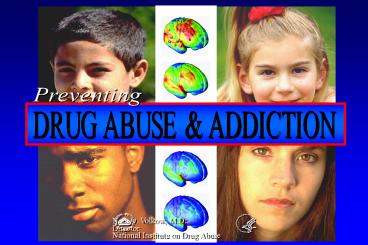Preventing - PowerPoint PPT Presentation
1 / 18
Title:
Preventing
Description:
Cocaine (mg/kg) .1. 1. 10 [11C]Raclopride Binding In Cocaine Abusers ... Bmax/Kd decreased with exposure to cocaine-cues presumably from DA increases. Caudate ... – PowerPoint PPT presentation
Number of Views:79
Avg rating:3.0/5.0
Title: Preventing
1
Preventing
DRUG ABUSE ADDICTION
Nora D. Volkow, M.D. Director National Institute
on Drug Abuse
2
ADDICTION IS A DEVELOPMENTAL DISEASE starts in
adolescence and childhood
1.8
TOBACCO
THC
1.6
ALCOHOL
1.4
1.2
in each age group who develop
time dependence
1.0
0.8
0.6
first
0.4
0.2
0.0
5
10
15
21
25
30
35
40
45
50
55
60
65
Age
Age at tobacco, at alcohol and at cannabis
dependence as per DSM IV
NIAAA National Epidemiologic Survey on Alcohol
and Related Conditions, 2003.
3
Top 3 Causes of Death among Youth 2002
Total Arrest Rate by Age and Sex, 1993-2001
4
5
6000
4
0
5000
3
5
3
0
4000
2
5
Percent of Total Deaths
3000
2
0
Arrests per 100,000 people
1
5
2000
1
0
1000
5
0
0
15
17
19
21
23
65
8
-
1
5
1
6
-
2
0
2
1
-
2
4
3
5
-
3
4
3
5
-
4
4
4
5
-
6
4
6
5
25-29
35-39
45-49
55-59
Age
Age
Uniform Crime Reports, FBI, 2001
National Center for Health Statistics, CDC,
Mortality Data 2002
4
Brain Architecture and Connectivity Changes
Through Adolescence
Amygdalofugal fibers in mPFC
Brain areas where volumes are smaller in
adolescents than young adults
Amygdalo frontal connections are not fully
developed until adulthood
Sowell, E.R. et al., Nature Neuroscience, 2,
859-861, 1999
Cunningham, M et al., J Comp Neurol 453, 116-130,
2002.
5
In Adults, Emotional Self Regulation Is
Normally Implemented By A Neural Circuit
Comprising Various Prefrontal Regions
Subcortical
Limbic Structures
6
Different Drugs, Same Ultimate Effect
Source Nestler, EJ and Malenka, RC, Scientific
American, pp. 78-85, March 2004.
7
Exposure to Drugs of Abuse During Adolescence
Could Have Profound Effects on Brain Plasticity
8
Exposure to Marijuana May Increase Later Drug
Problems Drug Use Outcomes in Twin
Pairs Discordant for Cannabis Use Before Age 17
7
6
Sedatives
5
Opiates
ODDS Ratio
4
Cocaine/ Stimulants
3
2
Cannabis
1
Drug Abuse/Dependence
Source Lynskey, MT et al., JAMA, 289, pp.
427-433, 2003.
9
The Adolescent Brain Responds to Nicotine
Differently than the Adult Brain
Treatment of adolescent rats (but not young
adults) with Nicotine leads to
Increases in Nicotine Self Administration
Increases in Nicotine Receptors
Source Adriana, W. et al., J of Neurosci,
23(11), pp. 4712-4716, June 1, 2003.
10
Factors Affecting Vulnerability
- Presence of a psychiatric disorder
- Physical abuse
- Poor social skills
11
The Adjusted Effect of ADHD Pharmacotherapy on
SUD Incidence
Unmedicated ADHD vs Controls OR (95 CI)
Medicated ADHD vs Unmedicated ADHD OR (95CI)
Any SUD at Follow-up Alcohol A/D Marijuana
A/D Cocaine/Stimulant A/D Tobacco A/D
0.15 (0.04-0.6) 0.16 (0.05-0.57) 0.42
(0.11-1.7) 0.20 (0.02-2.1) 2.4 (0.5-12.3)
6.3 (1.8-21.4) 5.8 (1.7-19.3) 3.1
(0.8-12.5) 7.5 (0.3-163.4) 0.85(0.15-4.8)
Untreated ADHD was a significant risk factor for
SUD in adolescence
Pharmacotherapy was associated with a reduction
in risk for SUD in ADHD youth
Source Biederman J. et al., Pediatrics, 104(2)
August 1999.
12
In Addition to Stopping Drug Abuse Before It
Starts We Need to Find Ways to Prevent Relapse
In Former Drug Abusers
Relapse Is Often Brought About By Stimuli That
Trigger Intense Drug Craving Including
- Priming
- A single exposure to the formerly
- abused substance
- Environmental Cues
- People, places or things associated
- with past drug use
- Stress
- Both acute and chronic stress can contribute
- to relapse
13
Medications for Relapse Prevention
Strengthen reinforcing effects of non-drug
reinforcers
Strengthen inhibitory control
Interfere with conditioned memories (craving)
Counteract stress responses that lead to relapse
14
Evaluation of A Hypothetical Treatment
Just Like Hypertension, Addiction Is A Chronic
Disease That Requires Continued Care
Source McLellan, AT, Addiction 97, 249-252, 2002.
15
Multiple Facets of the Individuals Life Must
Play A Part In PREVENTION
Educational System
Family
Medical Community
Criminal Justice System
16
The FRIENDS OF NIDA
Partnerships Are Essential In Advancing the
Science of Addiction and in Translating
Promising Strategies into Practice
SAMHSA
17
Adolescent Exposure to Cannabinoids Alters the
Response of VTA Dopamine Neurons to Drugs of
Abuse
Source Pistis, M. et al., Biol Psychiatry, 56
86-94, 2004.
18
11CRaclopride Binding In Cocaine Abusers
Viewing a Neutral and a Cocaine-Cue Video
Neutral
Cocaine-Cues
P
Neutral video
P
Bmax/Kd
Caudate
Ventral
Putamen
Striatum
Cocaine Cue video
Bmax/Kd decreased with exposure to cocaine-cues
presumably from DA increases































